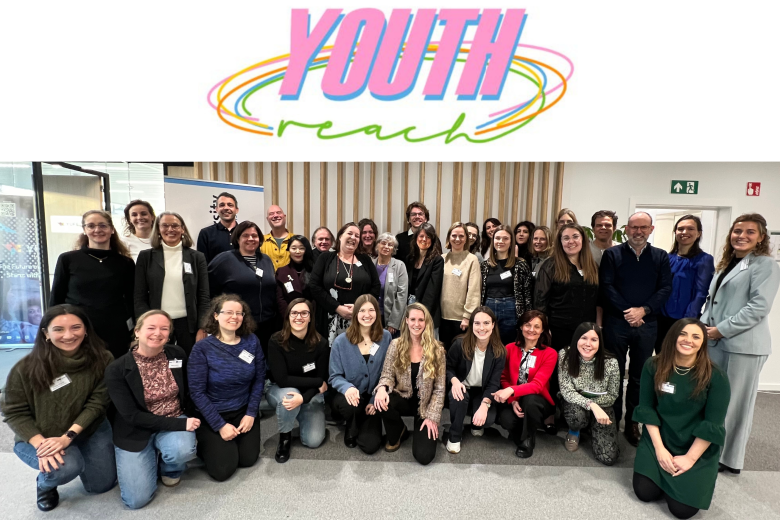The YOUTHreach study will evaluate and implement three very promising existing interventions to support young people w
When we asked about his favourite course, Milan told us, "It was definitely the 'Artificial Society' course in the second year. We explored the impact of AI on society, jobs, and businesses. The discussions on ethical dilemmas surrounding AI were fascinating, and it was a very contemporary, emotionally charged topic. There were some intense debates, but they were always civil, which made the course so engaging."
Reflecting on his academic journey, Milan said that his biggest challenge was writing his thesis. "Although we had some preparation with smaller papers throughout the programme, the final thesis was a whole different ball game. It's such a massive piece of work, and it’s key to keep a clear overview throughout the writing process. But once it was done, and I received the notification that I had passed, the sense of satisfaction was immense. It was a final product I could truly be proud of."
When we asked how he looks back on his time in Maastricht and at FASoS, he said, "Maastricht holds a special place in my heart. It’s cosy yet vibrant, with everything you’d expect from a city. Growing up in Limburg, I appreciate how Maastricht embodies the ‘burgundy’ way of life. The international atmosphere is also something I really enjoy. Whenever I return, it feels like coming home."
He also spoke about student life in Maastricht, saying, "The city is fantastic for enjoying a beer on a terrace under the summer sun. Most people here are students, so there’s a real sense of shared lifestyle. I think any student would feel at home here. What's also great is how close Maastricht is to nature. A short trip outside the city, and you can escape the hustle and bustle, which is a perfect balance."
Moving on to his current career, Milan told us, "I’m currently working as a consultant at Ciphix, where I help businesses digitalise their processes. We work closely with clients to identify solutions to their challenges, and then I take those solutions and create apps or other software to simplify their workflow."
When we asked how his studies helped with his current career, he explained, "The interdisciplinary nature of my studies really prepared me for this role. The ability to connect various aspects of the digitalisation process and identify potential issues before they arise is invaluable. The programme provided me with a broader perspective on digitalisation, which I now apply in my work."
Finally, we asked if he still stays in touch with students and staff from FASoS. He said, "Everyone has kind of gone their separate ways, but I joined the Digital Society group on LinkedIn, and it’s been great to see how well my peers are doing in their careers. Some have moved abroad, while others have stayed in the Netherlands. I’ve also returned to FASoS multiple times to assist with open days and give training sessions. It’s always nice to reconnect with tutors and professors."
In looking back on his time at FASoS and his current career, it’s clear that Milan Schils has successfully bridged the gap between theory and practice. His studies have not only shaped his career but also allowed him to continue making meaningful connections with the university long after graduation.
December 2024
When travelling to the Netherlands, you most likely won't arrive in the city of Maastricht, but at a different location nearby. No worries: with the information under the ‘Read more’ button you will find your way to your new home in no time.
Getting to Maastricht: mymaastricht.nl helps you on your way
Arriving in Maastricht for the first time can be very exciting! But at the same time, you may be wondering how to get to your accommodation from the train station or the airport. As most students coming to Maastricht arrive first somewhere else in the region, it may seem difficult to find your way to the city. No need to worry, the instructions given on mymaastricht.nl - the guide for every international student new to Maastricht - will help you forward!
Green travel options
UM is committed to promoting a more sustainable way of traveling to both students and staff. Therefore, we encourage students who have a travel time within 8-13 hours to take the train or bus as much as they can. By choosing a more environmentally friendly option such as the train or bus, your journey would emit less carbon and be more energy efficient.
The bus company FlixBus operates in nearly all of Europe and offers a cheap and reliable alternative. We have developed an interactive train travel check to help simplify decision-making. Here, you can see the direct carbon impact of your trip, the travel distance and possible train destinations within 8-13 hours of reach from Maastricht. It's easy to go through the map and compare the different options.
For more information about the CO2 impact of your trip, please head to our website.
Student Carpooling: Smarter Rides with Strive
Strive is making it easy for students to share rides - if you’ve got a car, offer a seat; if you need a ride, hop in. It’s a student-only carpooling service that’s simple, social, and sustainable - save money, meet new people, and reduce emissions all in one go. Click here to join the community.
Travel directions from your arrival airport to Maastricht Central Station
For basic train travel directions from several European airports to Maastricht Central Station, consult our website.
